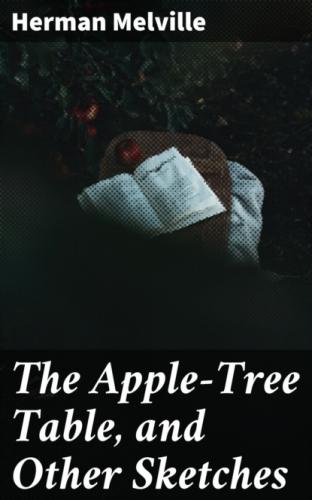But he has still other apples, not quite so ruddy, though full as ripe:—apples, that have been left to wither on the tree, after the pleasant autumn gathering is past. The sketch of The Old Apple Dealer is conceived in the subtlest spirit of sadness; he whose "subdued and nerveless boyhood prefigured his abortive prime, which likewise contained within itself the prophecy and image of his lean and torpid age." Such touches as are in this piece cannot proceed from any common heart. They argue such a depth of tenderness, such a boundless sympathy with all forms of being, such an omnipresent love, that we must needs say that this Hawthorne is here almost alone in his generation—at least, in the artistic manifestation of these things. Still more. Such touches as these—and many, very many similar ones, all through his chapters—furnish clues whereby we enter a little way into the intricate, profound heart where they originated. And we see that suffering, some time or other and in some shape or other—this only can enable any man to depict it in others. All over him, Hawthorne's melancholy rests like an Indian-summer, which, though bathing a whole country in one softness, still reveals the distinctive hue of every towering hill and each far-winding vale.
But it is the least part of genius that attracts admiration. Where Hawthorne is known, he seems to be deemed a pleasant writer, with a pleasant style—a sequestered, harmless man, from whom any deep and weighty thing would hardly be anticipated—a man who means no meanings. But there is no man, in whom humor and love, like mountain peaks, soar to such a rapt height as to receive the irradiations of the upper skies;—there is no man in whom humor and love are developed in that high form called genius; no such man can exist without also possessing, as the indispensable complement of these, a great, deep intellect, which drops down into the universe like a plummet. Or, love and humor are only the eyes through which such an intellect views this world. The great beauty in such a mind is but the product of its strength. What, to all readers, can be more charming than the piece entitled Monsieur du Miroir; and to a reader at all capable of fully fathoming it, what, at the same time, can possess more mystical depth of meaning?—yes, there he sits and looks at me—this "shape of mystery," this "identical Monsieur du Miroir!" "Methinks I should tremble now were his wizard power of gliding through all impediments in search of me to place him suddenly before my eyes."
How profound, nay, appalling, is the moral evolved by the Earth's Holocaust; where—beginning with the hollow follies and affectations of the world—all vanities and empty theories and forms are, one after another, and by an admirably graduated, growing comprehensiveness, thrown into the allegorical fire, till, at length, nothing is left but the all-engendering heart of man; which remaining still unconsumed, the great conflagration is naught.
Of a piece with this, is the Intelligence Office, a wondrous symbolizing of the secret workings in men's souls. There are other sketches still more charged with ponderous import.
The Christmas Banquet, and The Bosom Serpent, would be fine subjects for a curious and elaborate analysis, touching the conjectural parts of the mind that produced them. For spite of all the Indian-summer sunlight on the hither side of Hawthorne's soul, the other side—like the dark half of the physical sphere—is shrouded in a blackness, ten times black. But this darkness but gives more effect to the ever-moving dawn, that forever advances through it, and circumnavigates his world. Whether Hawthorne has simply availed himself of this mystical blackness as a means to the wondrous effects he makes it to produce in his lights and shades; or whether there really lurks in him, perhaps unknown to himself, a touch of Puritanic gloom—this, I cannot altogether tell. Certain it is, however, that this great power of blackness in him derives its force from its appeals to that Calvinistic sense of Innate Depravity and Original Sin, from whose visitations, in some shape or other, no deeply thinking mind is always and wholly free. For, in certain moods, no man can weigh this world without throwing in something, somehow like Original Sin, to strike the uneven balance. At all events, perhaps no writer has ever wielded this terrific thought with greater terror than this same harmless Hawthorne. Still more: this black conceit pervades him through and through. You may be witched by his sunlight—transported by the bright gildings in the skies he builds over you; but there is the blackness of darkness beyond; and even his bright gildings but fringe and play upon the edges of thunder-clouds. In one word, the world is mistaken in this Nathaniel Hawthorne. He himself must often have smiled at its absurd misconception of him. He is immeasurably deeper than the plummet of the mere critic. For it is not the brain that can test such a man; it is only the heart. You cannot come to know greatness by inspecting it; there is no glimpse to be caught of it, except by intuition; you need not ring it, you but touch it, and you find it is gold.
Конец ознакомительного фрагмента.
Текст предоставлен ООО «ЛитРес».
Прочитайте эту книгу целиком, купив полную легальную версию на ЛитРес.
Безопасно оплатить книгу можно банковской картой Visa, MasterCard, Maestro, со счета мобильного телефона, с платежного терминала, в салоне МТС или Связной, через PayPal, WebMoney, Яндекс.Деньги, QIWI Кошелек, бонусными картами или другим удобным Вам способом.
